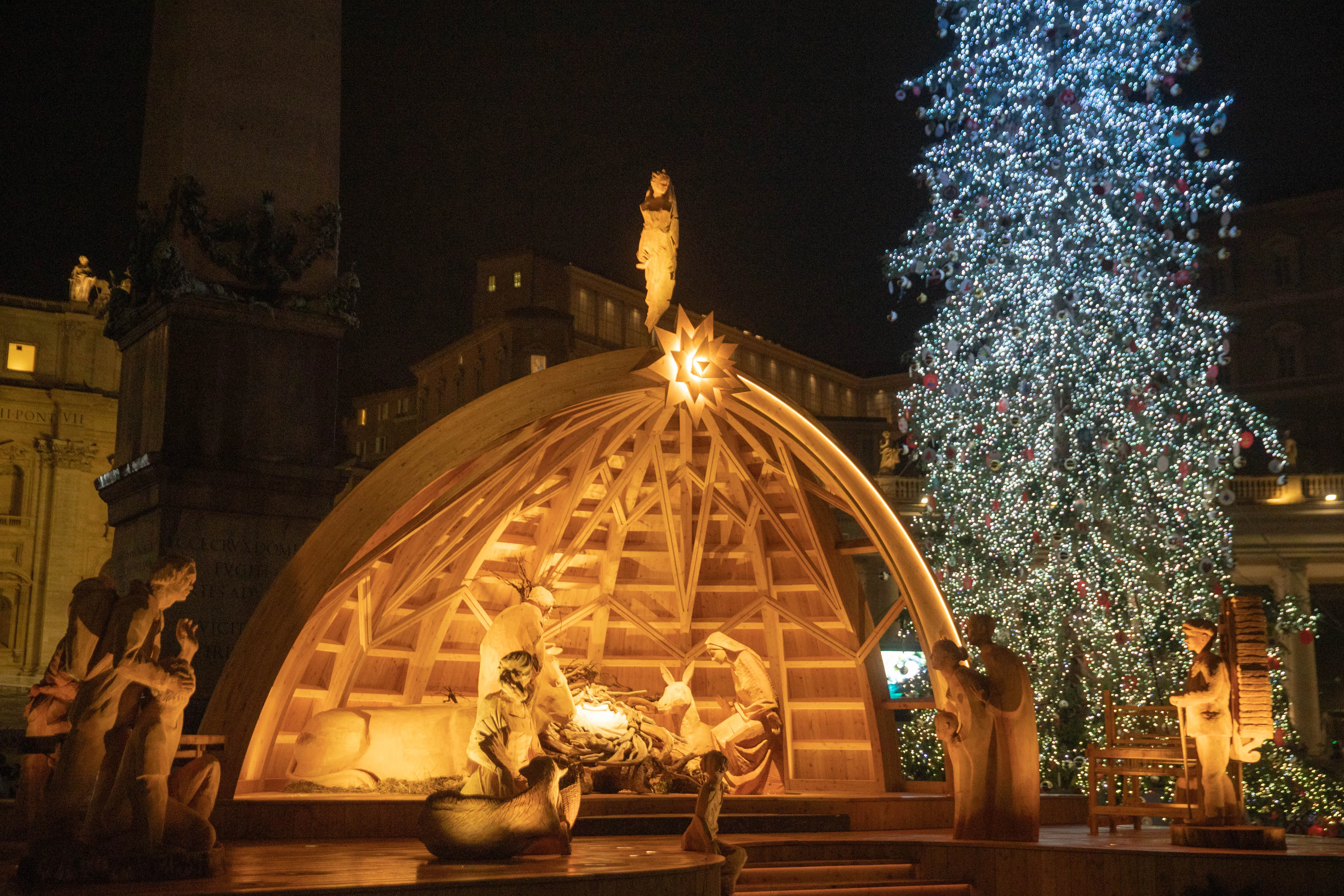Dear brother, dear sister, tonight God is drawing near to you, because you are important to him. From the manger, as food for your life, he tells you: “If you feel consumed by events, if you are devoured by a sense of guilt and inadequacy, if you hunger for justice, I, your God, am with you. I know what you are experiencing, for I experienced it myself in that manger. I know your weaknesses, your failings and your history. I was born in order to tell you that I am, and always will be, close to you”. The Christmas manger, the first message of the divine Child, tells us that God is with us, he loves us and he seeks us. So take heart! Do not allow yourself to be overcome by fear, resignation or discouragement. God was born in a manger so that you could be reborn in the very place where you thought you had hit rock bottom. There is no evil, there is no sin, from which Jesus does not want to save you. And he can. Christmas means that God is close to us: let confidence be reborn!
The manger of Bethlehem speaks to us not only of closeness, but also of poverty. Around the manger there is very little: hay and straw, a few animals, little else. People were warm in the inn, but not here in the coldness of a stable. Yet that is where Jesus was born. The manger reminds us that he was surrounded by nothing but love: Mary, Joseph and the shepherds; all poor people, united by affection and amazement, not by wealth and great expectations. The poverty of the manger thus shows us where the true riches in life are to be found: not in money and power, but in relationships and persons.
And the first person, the greatest wealth, is Jesus himself. Yet do we want to stand at his side? Do we draw close to him? Do we love his poverty? Or do we prefer to remain comfortably ensconced in our own interests and concerns? Above all, do we visit him where he is to be found, namely in the poor mangers of our world? For that is where he is present. We are called to be a Church that worships a Jesus who is poor and that serves him in the poor. As a saintly bishop once said: “The Church supports and blesses efforts to change the structures of injustice, and sets down but one condition: that social, economic and political change truly benefit the poor” (O.A. ROMERO, Pastoral Message for the New Year, 1 January 1980). Certainly, it is not easy to leave the comfortable warmth of worldliness to embrace the stark beauty of the grotto of Bethlehem, but let us remember that it is not truly Christmas without the poor. Without the poor, we can celebrate Christmas, but not the birth of Jesus. Dear brothers, dear sisters, at Christmas God is poor: let charity be reborn!
We now come to our last point: the manger speaks to us of concreteness. Indeed, a child lying in a manger presents us with a scene that is striking, even crude. It reminds us that God truly became flesh. As a result, all our theories, our fine thoughts and our pious sentiments are no longer enough. Jesus was born poor, lived poor and died poor; he did not so much talk about poverty as live it, to the very end, for our sake. From the manger to the cross, his love for us was always palpable, concrete. From birth to death, the carpenter’s son embraced the roughness of the wood, the harshness of our existence. He did not love us only in words; he loved us with utter seriousness!
Consequently, Jesus is not satisfied with appearances. He who took on our flesh wants more than simply good intentions. He who was born in the manger, demands a concrete faith, made up of adoration and charity, not empty words and superficiality. He who lay naked in the manger and hung naked on the cross, asks us for truth, he asks us to go to the bare reality of things, and to lay at the foot of the manger all our excuses, our justifications and our hypocrisies. Tenderly wrapped in swaddling clothes by Mary, he wants us to be clothed in love. God does not want appearances but concreteness. May we not let this Christmas pass without doing something good, brothers and sisters. Since it is his celebration, his birthday, let us give him the gifts he finds pleasing! At Christmas, God is concrete: in his name let us help a little hope to be born anew in those who feel hopeless!
Jesus we behold you lying in the manger. We see you as close, ever at our side: thank you Lord! We see you as poor, in order to teach us that true wealth does not reside in things but in persons, and above all in the poor: forgive us, if we have failed to acknowledge and serve you in them. We see you as concrete, because your love for us is palpable. Help us to give flesh and life to our faith. Amen.
Credit: Source link




